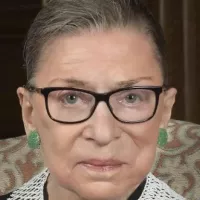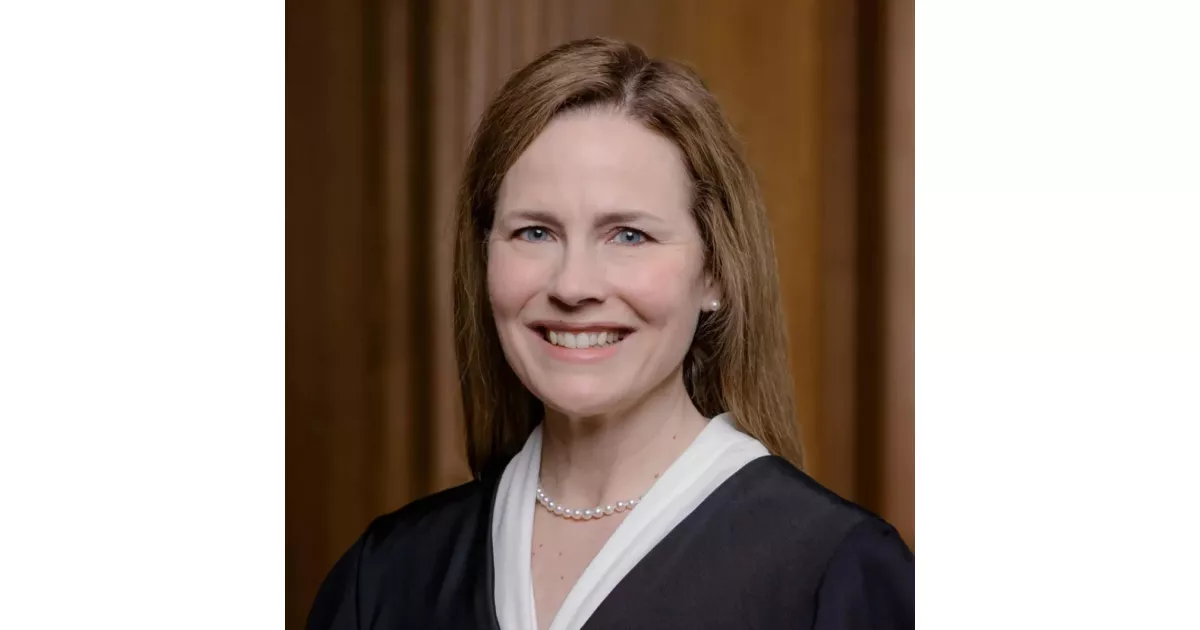Amy Coney Barrett is an American lawyer and jurist who serves as an associate justice of the Supreme Court of the United States since 2020. Nominated by President Donald Trump, she is the fifth woman to hold this position. Prior to her appointment to the Supreme Court, she served as a U.S. circuit judge of the U.S. Court of Appeals for the Seventh Circuit from 2017 to 2020.
January 28, 1972: Amy Coney Barrett's Birth
On January 28, 1972, Amy Vivian Coney Barrett was born. She would later become an American lawyer and jurist, and an associate justice of the Supreme Court of the United States.
1972: Amy Coney's Birth
In 1972, Amy Vivian Coney was born in New Orleans, Louisiana, to Linda (née Vath) and Michael Coney. She was the eldest of seven children.
1973: Mention of Roe v. Wade
In 2013, Barrett referenced Roe v. Wade (1973) in a Texas Law Review article, arguing it lacked widespread support as a 'superprecedent'.
1990: Graduation from St. Mary's Dominican High School
In 1990, Amy Coney Barrett graduated from St. Mary's Dominican High School in New Orleans, where she was the student body vice president.
1990: Employment Division v. Smith decision
In November 4, the court heard Fulton v. Philadelphia case, where CSS claimed the law is shown not to be neutral as required by the Court's 1990 decision Employment Division v. Smith, because the city labeled CSS's motives "discrimination that occurs under the guise of religious freedom."
1992: Reference to Planned Parenthood v. Casey
In 2013, Barrett referenced Planned Parenthood v. Casey (1992) in a Texas Law Review article, using it as evidence that Roe v. Wade had not attained the status of 'superprecedent'.
1994: Referenced Study by Michael Gerhardt
Barrett referenced a 1994 study by Michael Gerhardt, highlighting that textualist justices, including Scalia and Black, called for overruling precedents more often than non-textualist justices, though the reasons varied.
1994: Graduation from Rhodes College
In 1994, Amy Coney Barrett graduated from Rhodes College with a Bachelor of Arts, magna cum laude. She majored in English literature and minored in French.
1997: Clerkship for Judge Laurence Silberman Begins
In 1997, Amy Coney Barrett began serving as a judicial law clerk for Judge Laurence Silberman of the U.S. Court of Appeals for the District of Columbia Circuit. She served in this role from 1997 to 1998.
1997: Graduation from Notre Dame Law School
In 1997, Amy Coney Barrett graduated from Notre Dame Law School with a Juris Doctor, summa cum laude, and ranked first in her class. She was also an executive editor of the Notre Dame Law Review.
1998: Co-authored Law Review Article
In 1998, Amy Coney Barrett co-wrote a law review article with Professor John H. Garvey, which was discussed during her Senate Judiciary Committee hearing in 2017. The article argued that Catholic judges should in some cases recuse themselves from death penalty cases due to moral objections.
1998: Clerkship for Judge Laurence Silberman Ends and Clerkship for Justice Antonin Scalia Begins
In 1998, Amy Coney Barrett's clerkship for Judge Laurence Silberman ended. She then began clerking for Justice Antonin Scalia of the U.S. Supreme Court, a role she held from 1998 to 1999.
1999: Joined Miller Cassidy Larroca & Lewin
In 1999, Amy Coney Barrett started practicing law at Miller Cassidy Larroca & Lewin, a litigation firm in Washington, D.C.
1999: End of Clerkship for Justice Antonin Scalia
In 1999, Amy Coney Barrett's clerkship for Justice Antonin Scalia of the U.S. Supreme Court concluded.
1999: Marriage to Jesse M. Barrett
In 1999, Barrett married Jesse M. Barrett, a fellow Notre Dame Law School graduate, in South Bend, Indiana. Jesse Barrett is a partner at SouthBank Legal – LaDue Curran & Kuehn LLC and a law professor at Notre Dame Law School.
2000: Worked on Bush v. Gore
In 2000, Amy Coney Barrett worked on Bush v. Gore, providing research and briefing assistance for Baker Botts' representation of George W. Bush.
2001: Visiting Professor at George Washington University Law School
In 2001, Amy Coney Barrett was a visiting associate professor and John M. Olin Fellow in Law at George Washington University Law School.
2001: Merger of Law Firms
In 2001, the law firm Miller Cassidy Larroca & Lewin, where Amy Coney Barrett was practicing, merged with Baker Botts, a firm based in Houston, Texas.
2002: Joined Notre Dame Law Faculty
In 2002, Amy Coney Barrett joined the faculty at Notre Dame Law School.
2002: Left Miller Cassidy Larroca & Lewin
In 2002, Amy Coney Barrett left Miller Cassidy Larroca & Lewin.
2005: First Adoption from Haiti
In 2005, Amy Coney Barrett and her husband adopted their first child from Haiti.
2005: Joined the Federalist Society
In 2005, Barrett became a member of the Federalist Society.
2006: Anti-Abortion Advertisement
In 2006, Barrett signed an anti-abortion advertisement placed by St. Joseph County Right to Life, opposing abortion on demand and defending the right to life from fertilization to natural death.
2006: Federalist Society Membership
In 2006, Barrett was a member of the Federalist Society.
2007: Visiting Professor at University of Virginia School of Law
In 2007, Amy Coney Barrett was a visiting professor at the University of Virginia School of Law.
2010: Second Adoption from Haiti
In 2010, Amy Coney Barrett and her husband adopted their second child from Haiti, following the Haiti earthquake.
2010: Became Professor at Notre Dame Law School
In 2010, Amy Coney Barrett became a professor at Notre Dame Law School.
2010: Named Professor of Law at Notre Dame
In 2010, Amy Coney Barrett was named a professor of law at Notre Dame Law School.
2010: Appointed to Advisory Committee
In 2010, Chief Justice John Roberts appointed Amy Coney Barrett to serve on the Advisory Committee for the Federal Rules of Appellate Procedure.
2010: Retirement of John Paul Stevens
Upon joining the Court, Barrett became the only justice who did not receive their Juris Doctor from Harvard or Yale, since the 2010 retirement of John Paul Stevens.
2011: Pulled a Democratic Ballot in Primary
According to Politico, Barrett pulled a Democratic ballot in the 2011 primary.
2011: Spoke at Blackstone Legal Fellowship
From 2011 to 2016, Amy Coney Barrett spoke on constitutional law at Blackstone Legal Fellowship, a summer program established by the Alliance Defending Freedom.
2012: Criticism of Roberts' Opinion on the Affordable Care Act
Barrett has been critical of the majority opinion written by Chief Justice John Roberts in National Federation of Independent Businesses v. Sebelius (2012), which upheld the constitutionality of the Affordable Care Act's individual mandate.
2012: Letter Criticizing Obama Administration's Birth Control Coverage Approach
In 2012, Barrett signed a letter criticizing the Obama administration's approach to providing employees of religious institutions with birth control coverage, calling it an "assault" to religious liberty.
2013: Opposition to Roe v. Wade
In 2013, Barrett signed another ad against Roe v. Wade that appeared in Notre Dame's student newspaper and described the decision as having "killed 55 million unborn children".
2013: Texas Law Review Article on Stare Decisis
In a 2013 article in the Texas Law Review, Barrett listed seven cases she considered "superprecedents," excluding Roe v. Wade (1973), arguing it lacked widespread support. She referenced Planned Parenthood v. Casey (1992) as evidence.
2014: Held Research Chair at Notre Dame
In 2014, Amy Coney Barrett held Notre Dame's Diane and M.O. Miller II Research Chair of Law, a position she maintained until 2017.
2014: Rejoined the Federalist Society
In 2014, Barrett rejoined the Federalist Society.
2016: Voted in 2016 General Election
According to Politico, Barrett voted in the 2016 general election and the 2016 Republican primary.
2016: Spoke at Blackstone Legal Fellowship
From 2011 to 2016, Amy Coney Barrett spoke on constitutional law at Blackstone Legal Fellowship, a summer program established by the Alliance Defending Freedom.
2016: Senate Republicans Refused to Hold Hearings for Merrick Garland
In 2016, Senate Republicans refused to hold hearings for Merrick Garland during an election year. This became a point of controversy when Amy Coney Barrett was nominated in 2020 so close to the presidential election.
2016: Comparison to Merrick Garland Nomination
In 2016, the Senate Republican majority had refused to consider President Barack Obama's nomination of Merrick Garland, which caused anger over the move to fill the vacancy only four months before the end of Trump's term.
May 8, 2017: Nomination to U.S. Court of Appeals
On May 8, 2017, President Donald Trump nominated Amy Coney Barrett to the U.S. Court of Appeals for the Seventh Circuit.
September 6, 2017: Senate Judiciary Committee Hearing
On September 6, 2017, a Senate Judiciary Committee hearing was held on Amy Coney Barrett's nomination. During the hearing, Senator Dianne Feinstein questioned Barrett about her views on faith and judicial responsibility, particularly concerning death penalty cases. This led to Feinstein's comment about "the dogma lives loudly within you".
October 5, 2017: Senate Judiciary Committee Recommended Barrett
On October 5, 2017, the Senate Judiciary Committee voted 11–9 along party lines to recommend Amy Coney Barrett and report her nomination to the full Senate.
2017: 7th Circuit Confirmation Hearing
During her 2017 Senate confirmation hearing for the 7th Circuit Court of Appeals, Barrett stated that she would follow Supreme Court precedent while on the appellate bench.
2017: Appointment to U.S. Court of Appeals
In 2017, Amy Coney Barrett became a U.S. circuit judge of the U.S. Court of Appeals for the Seventh Circuit, where she served until 2020.
2017: AutoZone Civil Lawsuit Involvement
In 2017, Amy Coney Barrett joined the court as it received a petition for rehearing en banc in a civil lawsuit against AutoZone. The EEOC argued that AutoZone's assignment of employees to different stores based on race violated Title VII of the Civil Rights Act. Barrett voted to deny the petition to rehear the case.
2017: End of Research Chair at Notre Dame
In 2017, Amy Coney Barrett stopped holding Notre Dame's Diane and M.O. Miller II Research Chair of Law.
2017: Constitutional Commentary Article
In 2017, Barrett wrote an article in the law review Constitutional Commentary, reviewing a book by Randy E. Barnett where she stated that the Constitution's original public meaning is the law that must be adhered to until lawfully changed.
2017: Affordable Care Act Critique
In 2017, Barrett wrote that Chief Justice Roberts "pushed the Affordable Care Act beyond its plausible meaning to save the statute."
2017: End of Federalist Society Membership
In 2017, Barrett's membership in the Federalist Society ended.
2017: Barrett on Trump's List
In 2017, almost immediately after her court of appeals confirmation, Barrett was on Trump's list of potential Supreme Court nominees.
May 2018: Barrett Dissent on Right to Counsel
In May 2018, Barrett dissented from a panel decision that found an accused murderer's right to counsel was violated. Her position was later supported by a majority of the circuit's judges following a rehearing.
June 2018: Barrett on Lack of Expert Testimony in Pharmaceutical Case
In June 2018, Barrett wrote for a unanimous panel, finding that a plaintiff could not sue Teva Pharmaceuticals for alleged defects in her IUD due to the lack of supportive expert testimony.
July 2018: Barrett as Finalist for Supreme Court Nomination
In July 2018, after Justice Anthony Kennedy's retirement announcement, Barrett was reportedly one of three finalists Trump considered for the Supreme Court nomination.
August 2018: Barrett on Anonymous Tip and Vehicle Search
In August 2018, Barrett wrote for a unanimous panel, determining that police lacked probable cause to search a vehicle based solely on an anonymous tip about people "playing with guns," as no crime had been alleged.
2018: Voted in 2018 General Election
According to Politico, Barrett voted in the 2018 general election.
2018: Barrett as Possible Nominee
After Kavanaugh's selection in 2018, Barrett was viewed as a possible nominee for a future U.S. Supreme Court vacancy.
2018: Voted Against Striking Down Indiana Fetal Remains Law
In 2018, Amy Coney Barrett voted against striking down an Indiana law requiring burial or cremation of fetal remains. This vote was in the minority.
2018: Orchard Hill Building Co. v. U.S. Army Corps of Engineers case
In 2018, Barrett joined a unanimous panel decision in the Orchard Hill Building Co. v. U.S. Army Corps of Engineers case, challenging the Corps' determination about wetlands jurisdiction. The case was remanded for reconsideration.
2018: Howard v. Koeller Case
In 2018, Barrett was on a three-judge panel that found qualified immunity did not protect a prison officer who labeled a prisoner a "snitch" and thereby exposed him to risk from his fellow inmates in Howard v. Koeller.
January 2019: Barrett Denies Qualified Immunity to Homicide Detective
In January 2019, Barrett wrote for a unanimous panel denying qualified immunity to a homicide detective who knowingly provided false information in a probable cause affidavit used to obtain an arrest warrant. The court found this violated the plaintiff's Fourth Amendment rights.
February 2019: Joined Decision Upholding Chicago "Bubble Ordinance"
In February 2019, Amy Coney Barrett joined a unanimous panel decision upholding a Chicago "bubble ordinance" that restricts approaching abortion clinics or patrons without consent, citing the Supreme Court's decision in Hill v. Colorado.
February 2019: Barrett on unreasonable search of residence
In February 2019, Barrett wrote for a unanimous panel, which found that police officers had been unreasonable to assume "that a woman who answers the door in a bathrobe has authority to consent to a search of a male suspect's residence."
March 2019: Barrett dissents on gun control law
In March 2019, Judge Barrett dissented when the court upheld a federal law prohibiting felons from possessing firearms, arguing that it violated the Second Amendment in the case of non-violent offenders.
May 2019: Authored Opinion on Visa Denial Case
In May 2019, Amy Coney Barrett authored a 2–1 majority opinion in a case challenging the denial of a visa to a Yemeni citizen, upholding the consular officer's decision under the doctrine of consular nonreviewability.
June 2019: Authored Unanimous Decision in Purdue University Case
In June 2019, Amy Coney Barrett wrote a unanimous decision reinstating a suit brought by a male Purdue University student, John Doe, who alleged sex discrimination and due process violations by the university.
June 2019: Barrett on Fair Debt Collection Practices Act
In June 2019, Barrett wrote for the unanimous panel, finding that the Fair Debt Collection Practices Act cannot create a cause of action for a debtor who received collection letters lacking notices required by the statute, because she suffered no injury-in-fact to create constitutional standing to sue under Article III.
2019: Voted to Rehear Challenge to Indiana's Parental Notification Law
In 2019, Amy Coney Barrett voted to rehear a successful challenge to Indiana's parental notification law. This law required parental notification for minors seeking abortions.
2019: Wrote Opinion in Smith v. Illinois Department of Transportation
In 2019, Amy Coney Barrett wrote the unanimous three-judge panel opinion affirming summary judgment in the case of Smith v. Illinois Department of Transportation, concerning a Black employee's claim of racial discrimination.
June 2020: Dissent on "Public Charge Rule"
In June 2020, Amy Coney Barrett wrote a 40-page dissent when the majority upheld a preliminary injunction against the Trump administration's "public charge rule", which heightened the standard for obtaining a green card.
July 2020: Supreme Court Ordered Rehearing in Parental Notification Case
In July 2020, the Supreme Court ordered a rehearing in the parental notification case, where Barrett had previously voted to rehear a successful challenge to Indiana's parental notification law in 2019.
August 2020: Barrett on Teamsters Local Standing in Shakman Case
In August 2020, Barrett wrote for a unanimous panel holding that a Teamsters local did not have standing to appeal an order in the Shakman case because it was not formally a party to the case.
September 2020: Barrett on Illinois Republican Party's Request
In early September 2020, Barrett joined Wood's opinion upholding the district court's denial of the Illinois Republican Party's request for a preliminary injunction to block Governor J. B. Pritzker's COVID-19 orders.
September 18, 2020: Ginsburg's Death
On September 18, 2020, after the death of Associate Justice Ruth Bader Ginsburg, Barrett was widely mentioned as the front-runner to succeed her.
September 26, 2020: Nomination to the Supreme Court
On September 26, 2020, Amy Coney Barrett was nominated by President Trump to succeed Ruth Bader Ginsburg as a U.S. Supreme Court justice. This nomination occurred shortly after Justice Ginsburg's death and sparked controversy due to its proximity to the 2020 presidential election.
October 27, 2020: Barrett becomes Supreme Court Justice
On October 27, 2020, Barrett became the 103rd associate justice of the Supreme Court of the United States. Trump hosted a swearing-in ceremony at the White House the same evening.
November 2020: Barrett Assigned to Seventh Circuit
In November 2020, Barrett was assigned to the Seventh Circuit, with duties including responding to emergency applications to the Court arising from the circuit's jurisdiction.
November 26, 2020: Barrett Joins Majority in Roman Catholic Diocese of Brooklyn v. Cuomo
On November 26, 2020, Barrett joined the Supreme Court's majority in Roman Catholic Diocese of Brooklyn v. Cuomo, granting a preliminary injunction against certain COVID-19 restrictions instituted by New York Governor Andrew Cuomo, stating that the restrictions had likely impinged on the fundamental right of the free exercise of religion without their passing the legal test of strict scrutiny.
December 2020: Trump Pardons Rickey Kanter
In December 2020, President Trump pardoned Rickey Kanter, the plaintiff in the case where Barrett dissented regarding felon firearm possession in March 2019.
2020: Appointment to the Supreme Court
In 2020, Amy Coney Barrett became an associate justice of the Supreme Court of the United States, nominated by President Donald Trump.
2020: Political Reactions to Barrett's Nomination
In 2020, Barrett's nomination was generally supported by Republicans and opposed by Democrats, with controversies arising over filling the vacancy so close to the presidential election.
2020: Nomination Acceptance Speech
In 2020, during her nomination acceptance speech at the White House Rose Garden, Barrett said, "Judges are not policymakers, and they must be resolute in setting aside any policy views they might hold"; she also said judges "must apply the law as written".
2020: Barrett's Supreme Court Confirmation Process
In October 2020, the American Bar Association rated Barrett "well qualified". Her confirmation hearing began on October 12. On October 26, the Senate confirmed Barrett to the Supreme Court by a vote of 52–48, 30 days after her nomination and 8 days before the 2020 presidential election.
February 5, 2021: Barrett delivers first concurring opinion
On February 5, 2021, Barrett delivered her first concurring opinion in the case South Bay United Pentecostal Church v. Newsom.
March 4, 2021: First Majority Opinion
On March 4, 2021, Barrett wrote her first majority opinion in United States Fish and Wildlife Service v. Sierra Club. This opinion, unlike those of some recent justices, was for a divided court, reminiscent of Justice Ginsburg.
June 2021: Fulton v. City of Philadelphia Decision
In June 2021, Barrett joined a unanimous Supreme Court decision in Fulton v. City of Philadelphia, ruling in favor of a Catholic social service agency. The court declined to overturn Employment Division v. Smith.
August 12, 2021: Barrett rejects challenge to Indiana University's vaccine mandate
On August 12, 2021, Barrett rejected a challenge to Indiana University's vaccine mandate, marking the first legal test of COVID-19 vaccine mandates before the Supreme Court of the United States.
September 2021: Barrett Votes on Texas Abortion Law
In September 2021, Barrett joined the majority, in a 5–4 vote, to reject a petition to temporarily block a Texas law banning abortion after six weeks of pregnancy.
November 2021: Mercy San Juan Medical Center Appeal Rejection
In November 2021, Barrett voted with the majority in a 6-3 decision to reject an appeal from Mercy San Juan Medical Center, which sought to deny a hysterectomy to a transgender patient on religious grounds. The Court's decision left in place a lower court ruling in favor of the transgender patient.
January 2022: Barrett Dissent on Alabama Execution Case
In January 2022, the Supreme Court voted to allow the execution of an inmate to proceed in Alabama; the case was decided by a 5–4 vote, with Barrett joining Breyer, Sotomayor, and Kagan in dissent.
June 2022: Barrett votes to overturn Roe v. Wade
In June 2022, Barrett joined with the same majority in Dobbs v. Jackson, voting to completely overturn Roe v. Wade and Planned Parenthood v. Casey.
November 2023: Washington Conversion Therapy Ban
In November 2023, Barrett voted with the 6–3 majority to decline to hear an appeal of a decision that upheld Washington's ban on conversion therapy for minors, allowing the law to stand.
Mentioned in this timeline

Donald John Trump is an American politician media personality and...

George W Bush the rd U S President - is...

Ruth Bader Ginsburg was an American lawyer and Supreme Court...
The Affordable Care Act ACA also known as Obamacare is...

The White House located at Pennsylvania Avenue NW in Washington...

John Roberts is the th Chief Justice of the United...
Trending

3 months ago OpenAI & Foxconn Partner on AI Data Centers; Foxconn Invests Heavily in AI

3 months ago Biden Criticizes Trump's Democracy Stance, Addresses Shutdown, and Attends Ben Nelson Gala.

4 months ago Khachanov vs Griekspoor: Vienna Showdown Prediction, Odds, and Preview for the Erste Bank Open

3 months ago LIV Golf unveils 72-hole format expansion for 2026, challenging PGA Tour.

10 months ago Wunmi Mosaku Discusses 'Sinners,' Ryan Coogler, blues music and working with Michael B. Jordan
3 months ago Newly Built Chinese Bridge Collapses Months After Opening, Raising Safety Concerns
Popular

Kid Rock born Robert James Ritchie is an American musician...
The Winter Olympic Games a major international multi-sport event held...

XXXTentacion born Jahseh Dwayne Ricardo Onfroy was a controversial yet...

Barack Obama the th U S President - was the...

Michael Joseph Jackson the King of Pop was a highly...

KFC or Kentucky Fried Chicken is an American fast-food chain...
